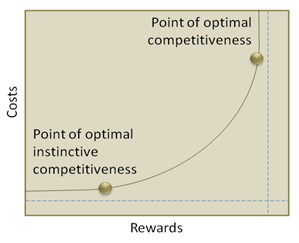Val Workman
The opinions expressed by the bloggers below and those providing comments are theirs alone, and do not necessarily reflect the opinions of Ryma Technology Solutions. As they say, you can't innovate without breaking a few eggs...
- Font size: Larger Smaller
- Hits: 35074
- 0 Comments
- Subscribe to this entry
- Bookmark
The Optimal Level of Competitiveness
Ask any high school student; they know just how much they have to do, at least for the short term. Let me call this the optimal level of instinctive competitiveness, after which point increasing competitiveness can only be achieved by increasing amounts of formalized product management processes. The question is how competitive does your company have to be, and for how long?
If you and your company can be competitive based on your instincts, then why would anyone do anything more? The answer is that you don't have a monopoly on the job. You'll eventually begin to worry that someone might be able to do the job better than you. The risk of losing your job bothers you more than the joy of not looking into what your customers really want. So you go beyond instinct, and do a little research.
I don't care how much industry knowledge you have, eventually instinct isn't enough. Just like you didn't want to risk your job, your company doesn't want to risk its product's success for the paltry reward gained by not doing product management.
Typically, companies begin with developing products instinctively. That behavior only goes so far, and one day you just get up and say I think I want to start paying for a product manager. Maybe you have extra cash just laying around? Who can imagine why someone would want their products to be more competitive? But it happens, and a product manager is hired.
Now here is where it becomes mind boggling, companies don't stop with one. With a little competitiveness come the desire for more. Maybe it's like beauty aids and face lifts, once you start, there's no slowing it down.
But we suspect there's a point when you're spending more on the competitiveness, than you're receiving from the rewards. You look around, and see that your competitors are doing the same thing. You have no choice, you've got to put more into your product management spend. The race is on and everyone in the market is looking for that elusive point of optimal competitiveness.
Problem is, it's never been found. I believe it was Deming who said, "Change is not required, survival is optional". Product managers continuously look for new ways to increase differentiation, and improve the cost-position. Together these two factors increase our competitive advantage.

When done correctly, product management always delivers more return than costs. The above graph is misleading in that your product management spend may increase when delivering more competitiveness, but your total product spend will drop, and margins increase. This is why there's not a point of optimal competiveness. Folks who think there might be just need to widen their vision a little. With growing product competitiveness comes increasing standards, and a improved quality of live for everyone.








